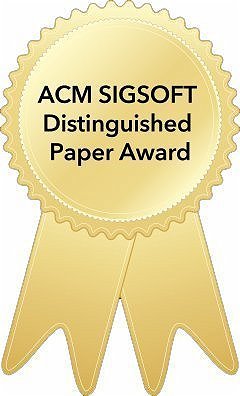A Transferability Study of Interpolation-Based Hardware Model Checking to Software Verification
Assuring the correctness of computing systems is fundamental to our society and economy, and formal verification is a class of techniques approaching this issue with mathematical rigor. Researchers have invented numerous algorithms to automatically prove whether a computational model, e.g., a software program or a hardware digital circuit, satisfies its specification. In the past two decades, Craig interpolation has been widely used in both hardware and software verification. Despite the similarities in the theoretical foundation between hardware and software verification, previous works usually evaluate interpolation-based algorithms on only one type of verification tasks (e.g., either circuits or programs), so the conclusions of these studies do not necessarily transfer to different types of verification tasks. To investigate the transferability of research conclusions from hardware to software, we adopt two performant approaches of interpolation-based hardware model checking, (1) Interpolation-Sequence-Based Model Checking (Vizel and Grumberg, 2009) and (2) Intertwined Forward-Backward Reachability Analysis Using Interpolants (Vizel, Grumberg, and Shoham, 2013), for software verification. We implement the algorithms proposed by the two publications in the software verifier CPAchecker because it has a software-verification adoption of the first interpolation-based algorithm for hardware model checking from 2003, which the two publications use as a comparison baseline. To assess whether the claims in the two publications transfer to software verification, we conduct an extensive experiment on the largest publicly available suite of safety-verification tasks for the programming language C. Our experimental results show that the important characteristics of the two approaches for hardware model checking are transferable to software verification, and that the cross-disciplinary algorithm adoption is beneficial, as the approaches adopted from hardware model checking were able to tackle tasks unsolvable by existing methods. This work consolidates the knowledge in hardware and software verification and provides open-source implementations to improve the understanding of the compared interpolation-based algorithms.
Wed 17 JulDisplayed time zone: Brasilia, Distrito Federal, Brazil change
11:00 - 12:30 | Formal VerificationDemonstrations / Journal First / Research Papers / Industry Papers at Pitanga Chair(s): Yunja Choi Kyungpook National University | ||
11:00 18mTalk | A Transferability Study of Interpolation-Based Hardware Model Checking to Software Verification Research Papers DOI Media Attached | ||
11:18 9mTalk | CoqPyt: Proof Navigation in Python in the Era of LLMs Demonstrations Pedro Carrott Imperial College London, Nuno Saavedra INESC-ID and IST, University of Lisbon, Kyle Thompson University of California, San Diego, Sorin Lerner University of California at San Diego, João F. Ferreira INESC-ID and IST, University of Lisbon, Emily First University of California, San Diego DOI Pre-print | ||
11:27 9mTalk | How We Built Cedar: A Verification-Guided Approach Industry Papers Craig Disselkoen Amazon Web Services, Aaron Eline Amazon, Shaobo He Amazon Web Services, Kyle Headley Unaffiliated, MIchael Hicks Amazon, Kesha Hietala Amazon Web Services, John Kastner Amazon Web Services, Anwar Mamat University of Maryland, Matt McCutchen , Neha Rungta Amazon Web Services, Bhakti Shah University of St. Andrews, Emina Torlak Amazon Web Services, USA, Andrew Wells Amazon Web Services | ||
11:36 18mTalk | Mission Specification Patterns for Mobile Robots: Providing Support for Quantitative Properties Journal First Claudio Menghi University of Bergamo; McMaster University, Christos Tsigkanos University of Bern, Switzerland, Mehrnoosh Askarpour McMaster University, Patrizio Pelliccione Gran Sasso Science Institute, L'Aquila, Italy, Gricel Vázquez University of York, UK, Radu Calinescu University of York, UK, Sergio García Volvo Cars Corporation, Sweden | ||
11:54 18mTalk | Rigorous Assessment of Model Inference Accuracy using Language Cardinality Journal First Donato Clun Imperial College London, Donghwan Shin University of Sheffield, Antonio Filieri AWS and Imperial College London, Domenico Bianculli University of Luxembourg | ||
12:12 18mTalk | Simulation-based Testing of Simulink Models with Test Sequence and Test Assessment Blocks Journal First Federico Formica McMaster University, Tony Fan McMaster University, Akshay Rajhans Mathworks, Vera Pantelic McMaster University, Mark Lawford McMaster University, Claudio Menghi University of Bergamo; McMaster University | ||